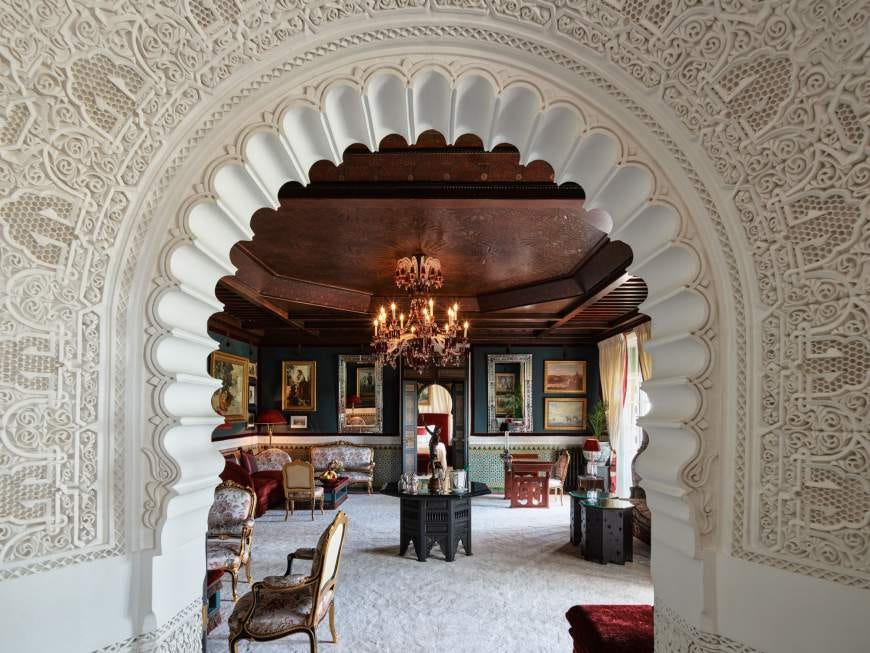
I’ve been working out of hotel lobbies lately. Untethered from an office, I wander in with a laptop, craving the atmosphere more than the WiFi. Hotel lobbies are strangely comforting spaces — you can be new in town or local and anonymous while feeling like you’re supposed to be there.
Lately, it’s the way they smell that gets to me. When did a nice, fresh feature become a ubiquitous, cliche’d bug? Most hotel scents tend to fall into a few categories: medicinal, like lemon-scented antiseptic posing as sanitized calm; too assertive, turning a warm welcome into a full-on assault; and just plain tacky — cloying and over the top, like a cheap cologne. But once in a while, the smell is just right. So precise and transporting, it locks into the warm and fuzzy part of my brain, ready to be recalled at a later date.
Olfactory Factory Settings
There was a time when hotels relied on fragrances primarily to cover up bad smells (like cigarette smoke in ‘70s casinos) or to evoke cleanliness (next to godliness in hospitality terms). “Environmental scenting” through ventilation and AC popped up in the ‘90s, around the same time aromatherapy became popular, to make spaces more pleasant and welcoming. Hotels began using custom scents in earnest in the early 2000s (Westin’s energizing White Tea scent was a pioneer). But the trend really took off a decade later when hotels realized that evoking powerful emotional connections was also a good way to reinforce brand identity. Which is why travelers now find fragrances diffused in lobbies, pumped into spas, and packaged as luxurious souvenir candles, room sprays, sachets, and reed diffusers.
Caroline Fabrigas, CEO of Scent Marketing Inc., who developed the smells of 1 Hotels and Auberge Resorts Collection, told me that testing is a major component of finding the right expression — not only the composition but the levels of diffusion. Done well, scent marketing “is an art and a science,” where brand cues and identity meet. One without the other can be overpowering. According to Fabrigras, “how the scent is diffused with the ideal calibration is key.” Much like trying to enjoy your morning coffee poolside while a techno remix of Maroon 5 rattles your teeth, entering an aggressively perfumed room can literally turn on your gag reflex.
The Nose Knows
In The Neurobiology of Olfaction, researchers discovered that odor memories are more emotional than memories triggered by visual or verbal cues. Scents have the uncanny ability to drum up autobiographical references in the mind — the most famous literary example is Proust’s description of madelines dipped into tea suddenly flooding him with memories (it’s even known as the Proustian Phenomenon). Fabrigas notes that the right scent “has also been known to aid in the desire for guests and clients to linger longer in a space.”
There are a few hotel fragrances that knocked me off my feet in a good way. La Mamounia tinged my clothes with the smell of orange blossom and jasmine so beautifully that I came home and didn’t want to unpack my suitcase — for weeks. Every time I unzipped my luggage, I took a trip back to Marrakech. At Four Seasons Resort Tamarindo, it was copal — smoky and resinous, like sunburnt bark — residing in my memory longer than my actual holiday. (IMHO, not all Four Seasons scents are created equal.)
There’s lots of science behind this, but it’s also just life: The nose remembers. Smell doesn't ask for interpretation or context. Walk into a great hotel, and something in the air tells you exactly where you are. The lobby becomes a threshold where you cross over into another time and place. At least for a little while. — Jeralyn
Lingering Scents
When they work, room fragrances can be mood makers and memory anchors. Here are a few favorites that get it right:
Costes Brown
Think baroque interiors, rum, bitter orange, dust, a surprisingly delicate combination of notes in the signature scent of Hôtel Costes, Paris. The Costes Passionatly body lotion is a heavenly mix of wood, spice, and incense.
Dates Eau de Toilette
La Mamounia’s signature fragrance of jasmine, cedar, date, and orange blossom is a Moroccan daydream.
Votivo Red Currant
The room scent Pavia misses the most (she lost her sense of smell 20 years ago) wafted through every cool downtown NYC boutique in the ‘90s.
Malibu Candle
The Surfrider Hotel’s signature scent transports you straight to a sunny day catching glassy waves.
Shangri-La Scent
A combination of expensive-smelling notes — like vanilla, sandalwood, bergamot, and ginger — are the Essence of Shangri-La, a scent with a cult following and a bunch of copy cats.
Thé Noir 29
Powerhouse fragrance maker Le Labo uses black tea and fig to lure modern luxury travelers to linger longer at the Edition. (It seems to be working.)



You taught me so much in this piece, and took me on a fantastic memory voyage--your descriptions of each scent were so evocative I was able to smell the ones I knew again. Thank you!
the nose knows!!